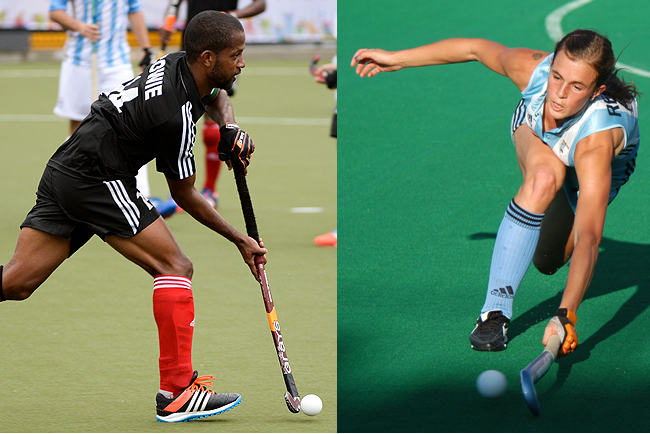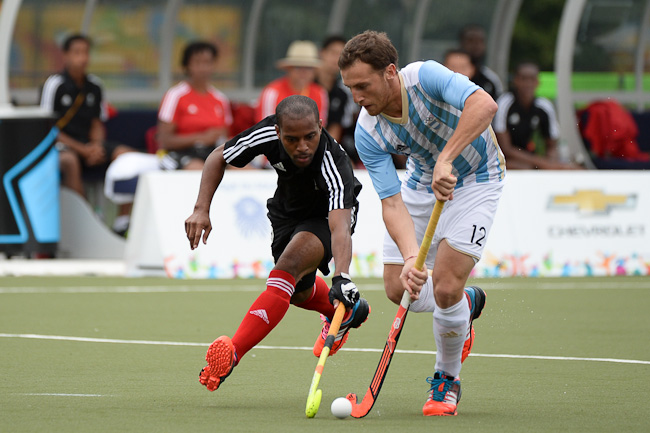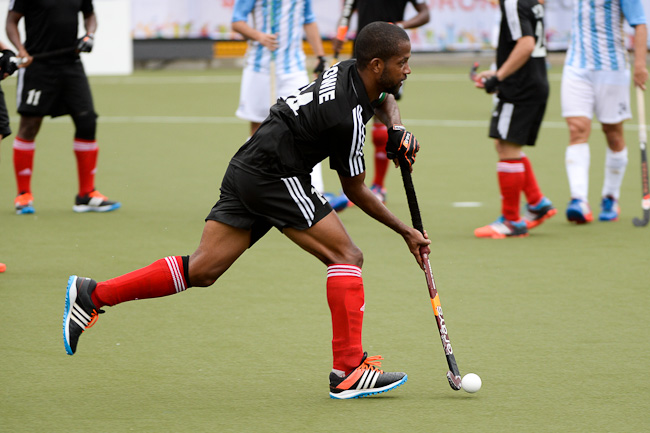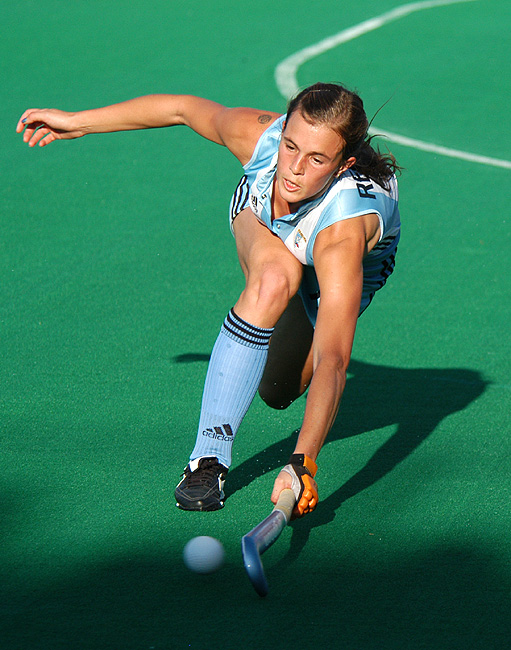
Even with Olympic medals, Champions Trophy titles and huge global success in your sport, you still remember back to where it all began. At least that is the belief of the three superstar hockey players who have spoken of their memories of competing in the Junior Pan American Championships.
Lucas Vila was just 19 years old when he played for Argentina in the 2005 Pan Am Junior Hockey Championship, but his nerves would have been steadied in his team’s opening encounter as the Argentinians got off to a 17-1 win over Jamaica and Lucas found himself on the score-sheet twice.
Talking about that tournament, Lucas says: “I was really excited and anxious at that moment. Because for our group this was our first big tournament and it was a very important step to get the qualification to the Junior World Cup.
“We played really well during the group phase,” he adds - in fact Argentina scored 46 goals and conceded just four in the opening rounds. The pressure increased on the team in the semi-final and final, but they beat Mexico and Chile respectively and continued to keep Argentina’s 100 per cent record in the competition.
What were the special moments during that tournament? Perhaps surprisingly, it is not the winning or the lifting of the trophy that Lucas remembers so well. Rather it is the unconventionality of the event. “Hmmm, we had a few special moments because it was hosted in Cuba. And there were some "non-traditional" situations to come to terms with. For example, we were training in an outside gym next to the hockey field, with no roof, only a sand-dust floor and some old weights. That made it very different and very special.”
For Lucas, that dusty gym was the bedrock of a glittering career. “It’s where it all begins... it’s a perfect moment to enjoy the game, maybe with less responsibility that you will get later on, with more freedom to play. It is also the first chance you really have to compare yourself against players from other countries. And off the field, when the match is over, there is even more joy, because all the players are a similar age and everything is new.”
Hockey runs through the Vila household, elder brothers Matias and Rodrigo both played for Argentina and were obvious role models to their younger sibling. Lucas also names Netherlands superstar Teun de Nooijer and Australia’s Jamie Dwyer as two players he has always looked up to.
To the current squad of young Argentine players getting ready for their first really serious foray onto the international stage, Lucas has this advice: “Take every match seriously, you will play it only once in your life! As I said it before, this is where all begins, so make sure you get off on the right foot. Above all, have fun and enjoy it! Off the field, find time to relax and make friends, but be careful to distinguish when is the time to relax and when you must be focused.”
Darren Cowie is a national hero in Trinidad and Tobago. Captain of the national team and coach to the Trinidad and Tobago team that will be contesting the title in Toronto in May, Cowie is one of the island’s leading lights in hockey development.
Like Lucas Vila, Darren played in the 2005 Pan Am Junior Hockey Championships and was team captain. He says: “There were some mixed feelings about this competition as it was meant to be played in 2004. Being a small hockey playing nation we lost out on a lot of players due to age who would have brought senior team experience to the squad. Nevertheless, the experience was a humbling one and gave me some much needed insight into the international side of the sport.”
During the tournament, Darren had some stand-out moments that he still re-lives 11 years later. “Scoring against Mexico to tie up the score still sticks in my mind. I stick-stopped on corners and, in this particular corner, the injection was a bad one and came to my fore-hand. What was worse was that when I hit the ball to goal I topped it. Luckily it caught the keeper and post man off guard and eventually bobbled into the goal. Sadly that goal was not enough and Mexico took the game 4-3.”
Darren recalls a high level of friendly competition between players within the team. In particular, he remembers Kiel Murray and Wayne Legerton – both of who went on to play for the senior national team – trying to claim the title of top scorer. “Both were deadly on corners,” he says. “Kiel with the hit, Wayne with the drag-flick. Wayne eventually outdid Kiel and ended up fifth on the total goal scoring list while Kiel was ninth. Pedro Ibarra of Argentina came out as the top scorer, while Pat Harris (USA) also tallied up a number of goals for the States.”
As young players relatively new to the international scene, Darren and his peers would inevitably experience times of doubt or a lack of confidence. He says that his remedy for times when things were not going so well was to work harder. “Negative feelings would show up from time to time and would also result in some bad touches on the ball. Something that helped me was knowing that there was one thing that I couldn't get wrong: that was hard work. So for every bad touch I had on the ball I would work twice as hard to regain possession and, in the next training session, I would work on my first touch just as much.”
A common theme among many of the players who represent their countries in the Pan Am Junior Championships is the amount of support they receive from their parents and family. For Darren, this was important, particularly as he spent much of his teens trying to decide between hockey, basketball and football. Fortunately for Trinidad and Tobago hockey, his parents had both been heavily involved in hockey and so steered their son in that direction. His height – 5’6” / 165cm – was also a deciding factor, Darren says, explaining how hockey overcame basketball eventually.
Outside the family, one man has proven to be a consistently influential figure and that is hockey legend Kwandwane Browne. Most capped player for Trinidad and Tobago and now an international coach, Darren says of Browne: “He was a mentor, and still is, especially as I’m now following in his footsteps and taking on more of a coaching role. But his attention to detail when playing is beyond comparison.”
Trinidad and Tobago finished eighth in 2005, just losing out to Barbados in the 7/8th play-off spot. For Darren this was the start of a long international career and ever greater involvement in hockey. But for him, the best moment of his career so far was the 2013 Pan American Cup, where Trinidad and Tobago won bronze. “It may not sound like much,” he says. “but it was the first time since 1967 that a Trinidad and Tobago senior hockey team had ever won a Pan Am medal. It was made even more special as I was trusted to carry on the captaincy by Kwan and coach Glenn 'Fido' Francis.”
Carla Rebecchi’s hockey career has been full of golden moments. Among her many trophies, the Las Leonas captain has five Champions Trophy gold medals; one World Cup gold and a silver and a bronze Olympic medal. Like Lucas and Darren, Carla is also a graduate of the 2005 Pan Am Junior Hockey Championships, a tournament that Argentina won after defeating the USA in the final.
Carla scored her first goal against Chile, but despite Argentina clocking up an incredible 53 goals in five games, with no goals conceded, the forward did not find the goal again until the final, which Argentina won 3-1 against the USA. For Carla however, the tournament was just the thing she needed to develop her own confidence and cement her place in the senior squad.
“I played only one Pan Am Junior Championship in Puerto Rico. I was already playing for the senior team, so I had a lot of expectations on me. I felt really excited before the first match. It was such a great tournament for me, I had been training for it since I was 17 – although I was 20 by the time the tournament came round.
“We had a great time there, everything was new for us, it was great to travel and see another country and meet people from other countries. I think that is the advice I would give young players today: ‘Enjoy the junior age group, it is great but it happens really fast. You must use the junior championships to gain confidence and be open to learning all they can.’





